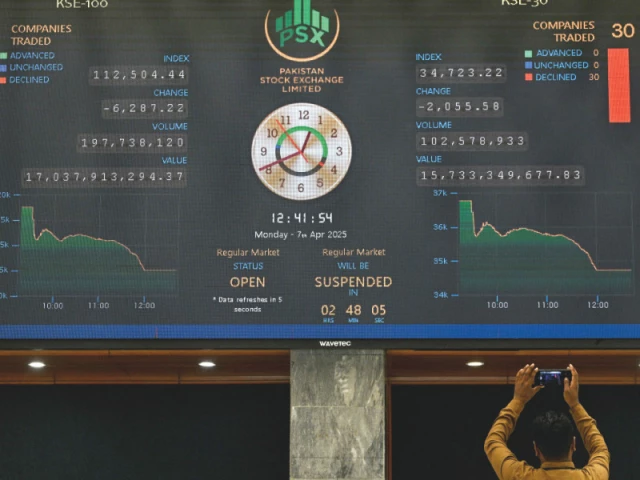PSX suffers historic single-day crash, loses 3,882 points
PSX suffers historic single-day crash, loses 3,882 points

The KSE-100 index faced a bloodbath on Monday, with the Pakistan Stock Exchange (PSX) mirroring escalating global trade tensions and fears of a global recession. As US President Donald Trump refused to back down from his tariff plans, retaliatory moves from China triggered fears of a broader trade war, causing markets to plunge around the world.
Asian equity markets took a nose-dive, European shares crashed to a 16-month-low, and oil prices sank as investors worried that the duties announced by Trump last week could lead to higher prices, weaker demand, and potentially trigger a global recession.
Goldman Sachs, alongside other major investment banks, has raised the odds of a US recession to 45% over the next 12 months. JP Morgan economists estimated that the tariffs may push the US economy into a 0.3% contraction, down from their previous estimate of 1.3% growth of GDP.
Speaking on the matter, Trump commented, "I don't want anything to go down. But sometimes you have to take medicine to fix something."
World leaders reacted to the news with bewilderment, with China, the world's No. 2 economy, referring to the tariffs as "economic bullying".
After stocks in mainland China and Hong Kong plummeted on Monday, China's sovereign fund stepped in to help stabilise the market.
The KSE-100 index saw its worst single-day decline in history, falling to an intraday low of 8,687 points (7.3%), and temporarily halting trading as a 5% drop in the KSE-30 triggered circuit breakers. By the end of the day, the index settled at 114,909 points, indicating a decline of 3,882 points, or 3.27%.
Despite some recovery towards the end of the session, the market remains volatile, and analysts expect the ongoing uncertainty until there is clarity on the US-China trade dispute.
Ahsan Mehanti of Arif Habib Corp commented that stocks plunged amid a severe sell-off in global equities after Trump showed no sign of backing away from US tariff plans, mounting the risk of global recession.
He added that a late session retreat was witnessed on hopes that the government would negotiate on US tariffs. The Prime Minister announced an industrial power tariff cut, and CPI inflation data stood at 0.7% year-on-year in March 2025, likely to further ease SBP policy next month, noted Mehanti.
Moreover, worries over the 29% massive US reciprocal tariff levies to be effective from next week, LSM contraction, and a falling rupee played a catalyst role in the record bearish close at PSX, he added.
At the close of trading, the benchmark KSE-100 index recorded a decrease of 3,882.17 points, or 3.27%, and settled at 114,909.49.
In its market review, Topline Securities commented that there was "carnage at the local bourse" as the market mirrored the global sell-off, opening on a sharply negative note and experiencing relentless selling pressure throughout the day. The benchmark index nosedived to an intraday low of 8,687 points, registering the largest intraday point-wise drop in PSX history.
While this decline set a new record in absolute terms, it was not the steepest in percentage terms. The most severe single-session percentage fall remains the 12.4% drop on June 1, 1998, noted Topline.
In response to the extreme volatility, trading was temporarily halted for one hour, triggered by the KSE-30 index falling more than 5% for five consecutive minutes, activating the market's circuit breaker mechanism.
However, some stability returned during the later hours as value hunters stepped in, helping the index recover part of the losses. The session eventually closed at 114,909 points, down by 3,882 points or 3.27%, remarked the brokerage.
The major drag on the index came from Engro Holdings, Oil and Gas Development Company, Pakistan Petroleum Limited, The Hub Power Company, and Pakistan State Oil (PSO), which collectively contributed a negative impact of 1,247 points.
Traded value wise PSO (Rs4.2bn), Mari Petroleum (Rs2.73bn), Oil and Gas Development Company (Rs2.45bn), Maple Leaf Cement Company (Rs1.92bn) and The Hub Power Company (Rs1.89bn) dominated the trading activity, added Topline.
Total market participation remained robust, with a traded volume of 702 million shares and a traded value of Rs42.7 billion, concluded Topline analysts.
In its review, Arif Habib Limited (AHL) remarked that having hit 120,000 target last week, Pakistan fell along with global markets on Monday.
Some 4 shares rose while 92 fell, with Oil and Gas Development Company (-6.04%), Pakistan Petroleum Limited (-5.99%) and The Hub Power Company (-4.95%) contributing the most to index declines. On the flip side, Tariq Glass Industries Limited (+1.07%), Standard Chartered Bank (+0.49%) and Ibrahim Fibres Limited (+0.41%) bucked the bearish trend, commented AHL. Trading was halted following a -5% decline in the KSE-30, after which some recovery was seen to trim the losses to -3.36% by end-of-day. Additionally, Finance Minister Aurangzeb announced that Pakistan will send a high-powered delegation to Washington to engage with the Trump administration following the United States' imposition of reciprocal tariffs on Pakistani goods, stated the brokerage.
It added that with the surge in volatility, rejection from new highs and gap down at the open 117,600-118,600 point bias will be to the downside against the "Monday Gap."
JS Global Analyst Muhammad Hasan Ather remarked that the KSE-100 index suffered its worst single-day decline in history. The dramatic selloff was primarily fuelled by China's retaliatory tariffs against the US, intensifying fears of a potential global recession. This escalation in trade tensions sent shockwaves through emerging markets, commented Ather.
Looking ahead, market volatility is expected to persist until there's clarity on the US-China trade situation, with investors advised to remain cautious in the short term, he added.
Overall trading volumes increased to 710.8 million shares compared with Friday's tally of 553.7 million.
Shares of 450 companies were traded. Of these, 52 stocks closed higher, 357 fell and 41 remained unchanged.
Worldcall Telecom was the volume leader with trading in 55.3 million shares, falling Rs0.07 to close at Rs1.28. It was followed by Cnergyico PK with trading in 53.4 million shares, falling Rs0.46 to close at Rs7.83 and Bank of Punjab with 34.2 million shares, falling Rs0.62 to close at Rs10.39.
World stocks
Stock markets and oil prices collapsed further on a black Monday for markets as US President Donald Trump stood firm over his tariffs despite recession fears.
Trading floors across the globe were overcome by waves of further selling after last week's sharp losses, with Trump telling Americans to "be strong, courageous, and patient," minutes before the New York stock market opened to drops of over three percent.
Wall Street was wracked by volatile trading, bouncing into positive territory on hopes of a 90-day pause in tariffs, only to sink lower when those were dashed by the White House.
Hong Kong collapsed by 13.2 percent, in its worst day in nearly three decades.
Trillions of dollars have been wiped off combined stock market valuations in recent sessions.
Taipei stocks suffered their worst fall on record Monday, tanking 9.7 percent.
Tokyo closed down by almost eight percent.
Frankfurt fell as much as 10 percent in early trading before paring back losses to end the day down 4.1 percent.
Bitcoin tumbled, while the dollar rebounded after sharp losses last week.
"The carnage in global equity markets has continued," said Thomas Mathews, Asia Pacific head of markets at Capital Economics.
A 10-percent "baseline" tariff on imports from around the world took effect Saturday.
Monday's savage selling was across the board, with no sector spared.
Tech firms, carmakers, banks, casinos and energy firms all felt the pain as investors abandoned riskier assets.
Concerns about future energy demand saw oil prices sink as much as three percent, having dropped some seven percent Friday.





















COMMENTS
Comments are moderated and generally will be posted if they are on-topic and not abusive.
For more information, please see our Comments FAQ